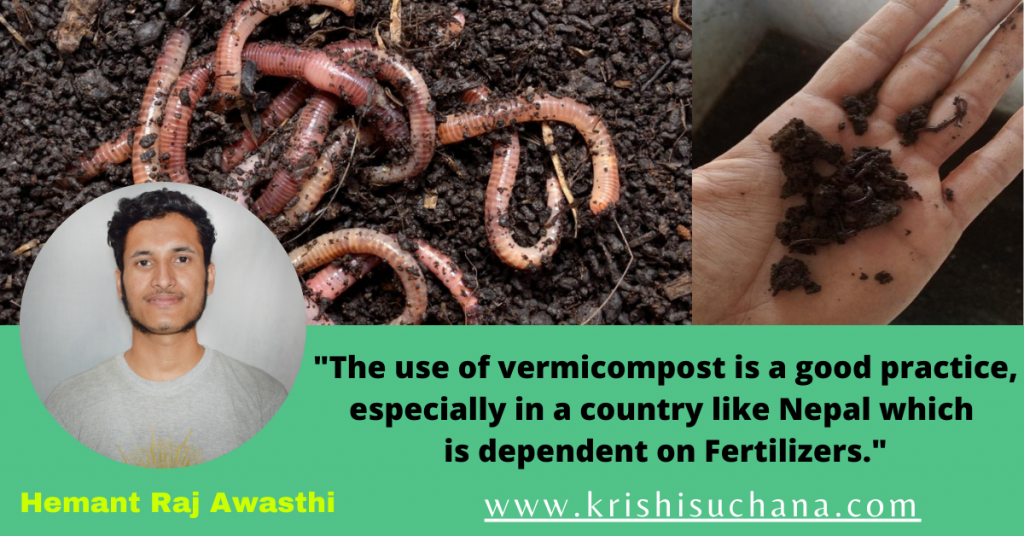Organic farming for the resilient food system: Vermicomposting a new normal practice

Agriculture is the fundamental aspect of Nepalese daily life, most important thing in agriculture is the healthy soil for good production but at the time the condition of our soil is getting very dilapidated. Our country stands as one of the poorest countries in the world. Highly susceptible to natural disasters, like earthquake, drought, floods and landslides, vulnerability to fluctuations in global market and price, civil unrest, and poor infrastructure drive food insecurity in the country. Disparities in education, health, wealth and nutrition exacerbate vulnerabilities in marginalized communities, pushing them behind even deeper.
Representing the country, if we look at the rural and difficult Bajura district, there is a scarcity of 11,000 tons of food annually. Although farmers are always engaged in the farming day and night, only 4.4% of the people are dependent on local produce. The total budget of Nepal for fiscal year 2077/78 is Rs41.40 billion for the agriculture sector, estimating only 2.81% of the total budget where major occupation of about 65 % Nepalese is agriculture based production and services. Although the budget for agricultural sector has increased by 6.60 billion in the current fiscal year, 26.57% of total agricultural budget Rs11 billion has been allocated to purchase the chemical fertilizer without giving foremost priority to agri-entrepreneurship and employment.
Despite knowing the fact, establishment of chemical fertilizer plant in Nepal is not feasible economically as well as technically, the best alternative to this igniting problem is organic production, which does not allow the country to remain dependent forever. Farmers do not get fertilizer when they need it. At present, the demand in Nepal is 800,000 tons while the supply of fertilizer is only 380,000 tons. No matter how much budget is allocated for chemical fertilizer, there will be no significant difference in the supply of the fertilizers.
Vermicompost is the new concept in the organic agricultural cultivation and production, use of the different species of earthworms, as Eisenia feitida (Red wigglers), Lumbricus rubellus gives the high value manure, and this solution is strong enough that can solve the all chemical fertilizer related problems in the Nation. Traditionally, preparation of the kitchen garden manure or farm yard manure takes the long time up to six months for well prepared manure form, in industrial scale with different processing and management aspect it can be prepared in about 125 days, while vermicompost can be prepared well at intervals of 70-80 days.
Worms consumes about 90% organic matter and uses only 10-20% soil, once earthworms are scattered over the bed of height 2 to 3 feet they dwell deep and convert organic matter into ‘Black Gold’. Worm-casting is the high value product having vitamins, hormones as well as anti-bacterial and anti-fungal properties. Normal manure or compost manure requires 20-25 tons per hectare of land whereas vermicompost only 5-6 tons per hectare meets that requirement. The changes in both biological and chemical parameters showed and proved that the vermicompost could be kept up to 3 months with good quality. Earthworm species like Red wiggler worms are frequent producers.
If conditions in Vermi bed, pit or bin are ideal, each worm can produce up to 7 worm hatchling per week. Naturally earthworm is hermaphrodites, with both male and female parts, every worm in the bed has the potential to lay and fertilize eggs. It is only convenient for composting to be practiced outdoors while vermicomposting with vermin-bin can be prepared outdoor as well as indoor. Vermicompost is dominated by mesophilic microbes and it significantly plays major role in crop production but compost manure is dominated by the thermophilic microbial populations. Worm tea and Vermi wash along with vermicompost are also important products for organic farming.
Due to its various benefits and potentials, the use of vermicompost is a good practice, especially in a country like Nepal which is dependent on Fertilizers, in this type of farming, it is very important to get everyone’s attention.
Writer: Hemant Raj Awasthi (B.Sc Agriculture, 6th semester, College: IAAS Lamjung Campus)

